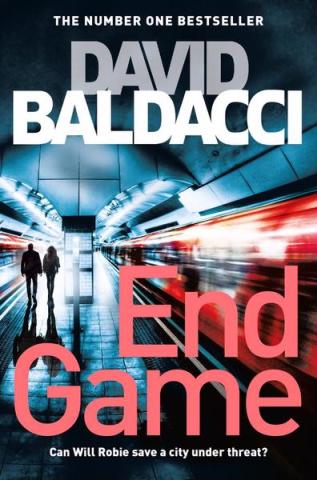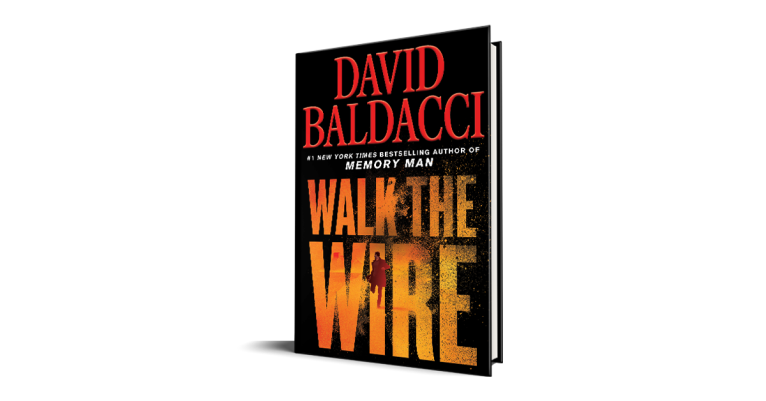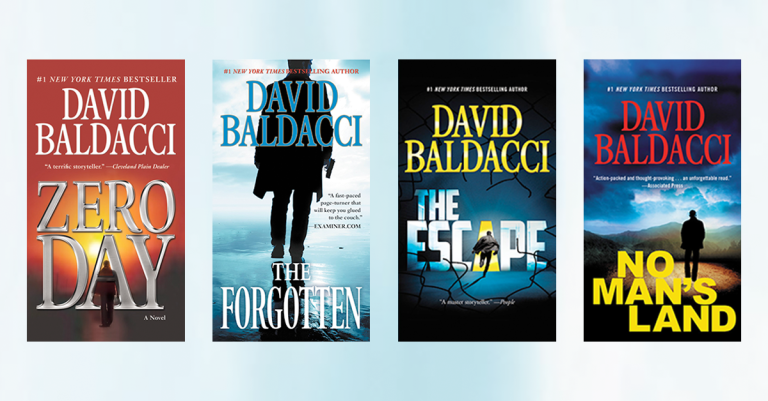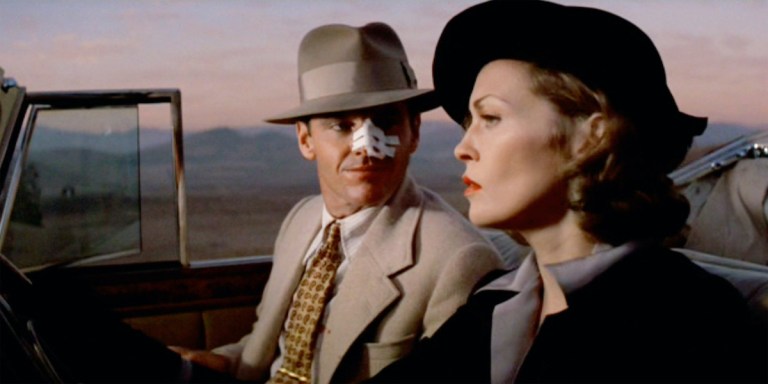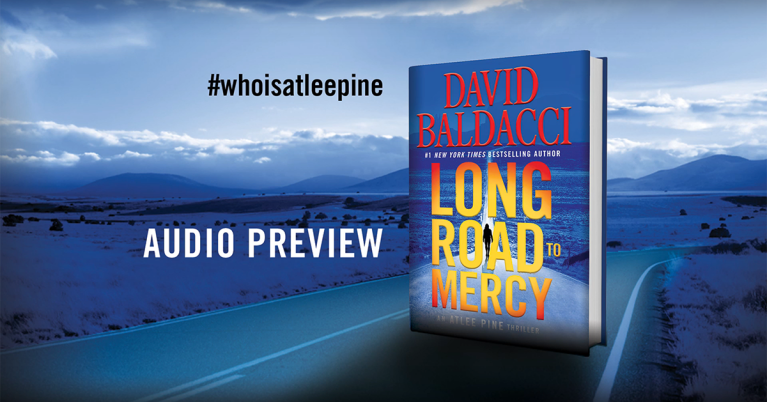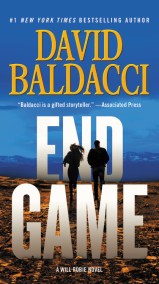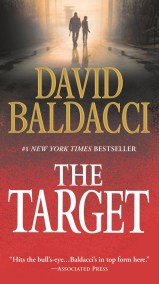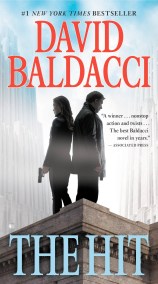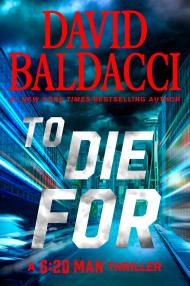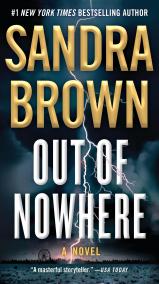CHAPTER 1 (EXCERPT)
AS WILL ROBIE STARED out the plane window, he knew the next twenty-four hours could possibly be his last ones on earth.
Yet that was simply another day on the job for him.
The undercarriage of multiple reinforced wheels touched down and grabbed the tarmac, and the thrust reversers engaged. The world’s largest commercial airliner taxied to a stop at the gate. The doors, both forward and aft, on the upper and lower cabins opened. The passengers trooped down the Jetways and into Terminal Five at Heathrow Airport.
The English skies were slicked with fat, darkened clouds and the rain was falling. It was weather familiar to any Brit.
Robie, wearing a navy blue two-piece tailored suit and fitted white collared shirt, was among hundreds of passengers deplaning the British Airways jumbo A380 just landed from Washington, DC.
The flight had become a little bumpy midway over the Atlantic. However, Robie hadn’t noticed. With his flat business-class seat, he’d slept pretty much the whole ride.
He cleared Customs, informing the border officer that he was there solely on business of an academic nature. He had carried on his single small bag and thus had no reason afterward to go to Baggage Claim. Everything he would need was already in London. And none of it was anything he could reasonably have carried on a plane.
It was seven thirty a.m. local time when he finally exited the airport.
Robie rode in a multicolored taxi into the city, which, with traffic and the rainy weather, took well over an hour. He was dropped off at an address near Marylebone Road. It wasn’t a hotel, but rather a nondescript private row house near the juncture of Marylebone and Baker Street. Robie punched in a code on the electronic box set next to the front door, and the fortified portal unlocked. He walked in, secured the door behind him, and headed upstairs.
He exchanged his two-piece suit and dress shirt for more casual wear. He popped open a wall safe in the closet and took out the flash drive. His Agency used cloud computing, but the leadership didn’t fully trust that it couldn’t be hacked, since clearly anything could be hacked. He pulled out his laptop and inserted the drive in the USB port. He tapped some keys and up on the screen appeared the only reason he had come to London.
It was a read-only document, and it was not remotely business of an academic nature.
He absorbed the information on the screen. It ended with a note from Robie’s superior, Blue Man. His real name was Roger Walton. The term Blue Man came from his exalted position at their Agency. The note, written more than a week earlier, was brief and to the point, just like Blue Man always was.
You can do this for one simple reason: You’re Will Robie. I’ll see you when we both get back. Onward.
Robie understood that in those few words was a volume’s worth of meaning.
I am Will Robie and I’ve been through hell and back. And I will survive this.
Onward.
He next performed an NSA-level wipe of the flash drive, tantamount to smashing it flat with a brick then setting it afire. The ones and zeroes were permanently gone, now existing only in his memory.
He stretched out on the bed and stared up at the ceiling.
Mississippi seemed a long time ago.
His father seemed a long time ago.
Everything seemed a long time ago.
He was back in harness and glad for it, because all other elements of his life sucked.
Stop the bullshit. This is your life.
Like the NSA cleanse on the flash drive, he shed these thoughts and closed his eyes. Despite his rest on the plane, he needed sleep. He would not be getting any later tonight.
He rose in the early evening and checked the sky. Still cloudy, but no more rain. Since this was London, that could change at any moment.
He ate at a nearby pub and walked the pavements. His swift gait carried him past many buildings and hundreds of people walking along in what he knew was a blissful ignorance of another possible attack on London. Then again, full knowledge might have started a panic. And they couldn’t have that, could they? Londoners had endured several recent terrorist attacks. Evil driving in cars had smashed into innocent pedestrians on both Westminster and London Bridges. Yet with enviable courage and calm, the town’s citizenry were carrying on with their lives. But something else was up now and it had to be dealt with.
So they had sent Will Robie.
He returned to his row house, made some calls on a secure line that bounced off one particular bird in the sky, and was told that everything was a go for the moment. As with the weather, he knew that could always change.
It was like a false start in the hundred-meter dash. Cocked and locked and fired and then called off. It could be unsettling.
It was a wonder he wasn’t messed up from it.
Well, maybe he was.
Robie sat by the window for two hours, like a sentry on watch, missing nothing. This place was heavily—though discreetly—fortified and monitored 24/7 by eyes on another continent. Still, his stone-cold rule was to rely on himself and no one else. He was the one who would die if everything went to shit. The eyes on the other continent might simply get a memo on how to fix the mess in the future.
A little too late to do him any good.
Darkness had come as the globe spun on its axis, and another part of the world got to see the light.
He checked his phone. The solitary bird in the sky told him that his mission was still a go.
Later, Big Ben chimed midnight. It was a soothing, familiar melody to most Brits. To Robie, it was like the sound of a time card being punched.
He donned a customized, lightweight, black one-piece waterproof motorcycle suit and left by the back door. He opened the locked door of a garage in the mews and climbed astride the black Ducati XDiavel parked there and key-started it. The big engine bled noise and power through its stacked twin oval exit pipes. He slipped on his helmet, popped the kickstand, gunned the throttle, and blew out of the garage riding a power plant that displaced more than twelve hundred ccs cranking at a max rpm of 9,500. Its Bosch fuel injection system was a full ride-by-wire package.
For most, this was an expensive toy that, fully racked out, would set you back about twenty grand.
Tonight, it was simply Robie’s ride to work.
He headed northwest.
The bike’s tires gripped the asphalt firmly and threw up rainwater as he flashed through nearly empty streets. A bit later his destination was up ahead. Well, it was the first of his destinations tonight. He thundered into an alley and quickly slowed.
He cut the power to the bike, hopped off, and used a tool hidden behind a dustbin to lift the manhole cover located there. This was Destination #1. He used the metal rungs to clamber down about a hundred feet.
He kept his helmet on for one reason only.
He hit a switch at the back of the headpiece, and his helmet became the latest-generation panoramic night-vision optics, the same platform used by American combat pilots. It enhanced the visuals in the darkened utility tunnel to such a degree that it was almost like he was on the surface of the sun, minus the heat. Researchers were now working on contact lenses utilizing a thin layer of graphene between slender layers of glass that could take the place of the current bulky devices. The percentage of light pickup was not yet where it needed to be to make the innovation viable, so for now, Robie wore a bulky helmet to see in the dark.
High-tech to kill.
But it wasn’t like the other side came to the battle with six-shooters and WWII-era optics.
He looked at his watch. He was one minute ahead of schedule. He slowed his pace. Early in his line of work was never a good thing.
He was forty-one years old, six one, a buck-eighty, and physically ripped because his job required it. His endurance levels and pain tolerances were off the chart—again, because they had to be. He had been selected for this line of work with the basic requirements already in place: He had a body, he had a mind, and he feared basically nothing.
Then over the years they had ground into him a whole other being, still possessing the basics plus a spectrum of skills that most people could never imagine, much less achieve.
Some days it was hard for Robie to see where the machine ended and the human began. If the human was in fact still there. In Mississippi it had shown itself. Now? It had receded.
Maybe forever.
His face was lean and weathered, and his eyes deep-set and alert. His hair was always cut short because he had no time to bother with it. He had old wounds and scars over his torso and limbs; each told a story of near-fatal results he would rather forget.
As he walked along he moved his right arm in a slow circular motion. All surgically repaired, scar tissue removed, tendons and ligaments all tidied up, as the Brits would say. It was 99 percent of what it used to be, the docs had assured him. That was really good. But really good rarely cut it in Robie’s world.
They rebuilt me. But am I as good as I was? Or am I a slightly lesser version?
He would find out tonight if the missing one percent made the key difference between his walking away from this or remaining behind as a corpse.
Destination #2 was just up ahead.
If the Ducati had gotten him to Destination #1, what was coming up would get him back.
Alive.
He used a key to unlock a door set in the wall of the tunnel he was in.
Inside the small storage room revealed behind the door, he gunned up and put on his protective gear, which included the newest generation of personal armor.
His main arsenal consisted of an H&K UMP chambered in .45 ACP with a thirty-round box mag. He checked all working parts of the weapon and slung it over his shoulder. He slipped two extra mags into long pockets on his one-piece designed for just this purpose.
He figured if he couldn’t do the job with ninety rounds he didn’t deserve to come back. But just in case, there were twin M11s, each chambered in ten-millimeter with a laser sight built under the barrel. Where the dot hit so did the round.
He slipped the gun belt around his waist. Both pistols rode on the left side so he could pull with his dominant right hand, though if it came to it, he could kill ambidextrously with great efficiency.
A German-made KM2000 combat knife in its holder was attached to his belt.
Two M84 stun grenades were cradled in pockets on the rear of his belt.
Robie closed the door behind him and walked on.
Destination #3 was a quarter mile away.
In a fairly short time, Will Robie would know if he would get to see another sunrise or not.

